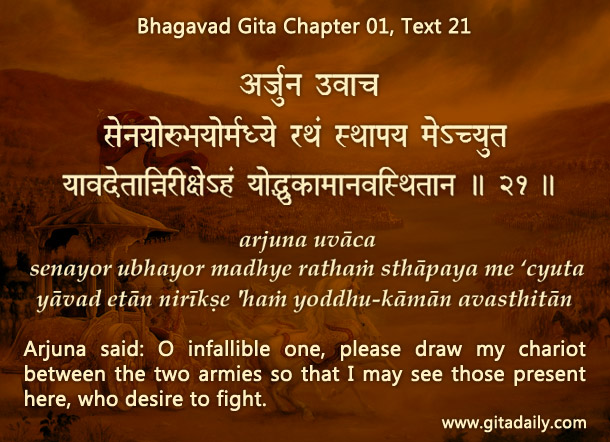Good movies often use plot twists to captivate their audiences. When events are moving in a particular direction and suddenly something unexpected happens, that makes for irresistible watching. For example, if a hero suddenly does something villainous or cowardly, that can be a great plot twist.
The Bhagavad-gita features such a great plot twist in its first chapter. When the Gita’s first twenty verses describe the armies of the Pandavas and the Kauravas assembled on the Kurukshetra battlefield, several describers suggest that events are flowing toward the triumph of the Pandavas. Their formidable military formation rattles Duryodhana (01.02), who then tries to reassure both himself and his forces (01.03-11). During his speech, Duryodhana, through an ambiguous choice of words, or possibly a Freudian slip of the tongue, lets his fear slip through: he states inadvertently that the Pandavas’ forces are stronger than his (01.10). When both sides blow their conchshells to signify the start of the war, the sound of the Kauravas’ conchshells doesn’t disturb the Pandavas, but the sound of the Pandavas’ conchshells shatters the Kauravas’ hearts (01.19).
Yet when the Pandavas seem to be on course to a glorious victory, suddenly their foremost warrior, the champion archer Arjuna, desires to see the opponents instead of attacking them (01.21-23). Then, he becomes emotionally overwhelmed (01.27-30), articulates several ethical reservations about the impending war (01.31-45) and finally refuses to fight (01.46). For a fearless warrior like Arjuna to be overcome by fear on the battlefield is so unexpected and so unbelievable as to raise several burning questions such as: What will happen next? How will Krishna address Arjuna’s concerns? What will Arjuna finally do?
When we seek answers to such questions through the Gita’s narrative, its philosophical analysis becomes much more riveting and relevant.
One-sentence summary:
By describing Arjuna’s refusal to fight just when the Pandavas seem to be on course to a victory, the Gita introduces an incredible plot twist that raises the interest and the stakes in its core philosophical deliberations.
Think it over:
- How do the Gita’s first twenty verses indicate the direction in which events are moving?
- What is the plot twist in the Gita’s first chapter?
- How does this plot twist affect the Gita’s central message?
***
01.21: Arjuna said: O infallible one, please draw my chariot between the two armies so that I may see those present here, who desire to fight.
To know more about this verse, please click on the image


Leave A Comment